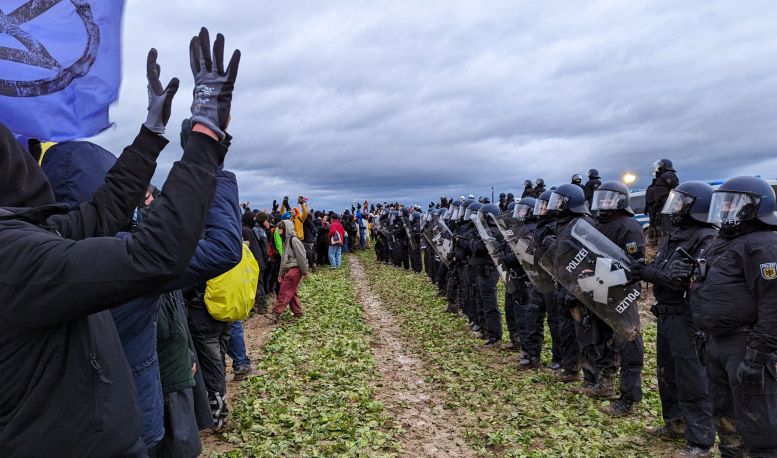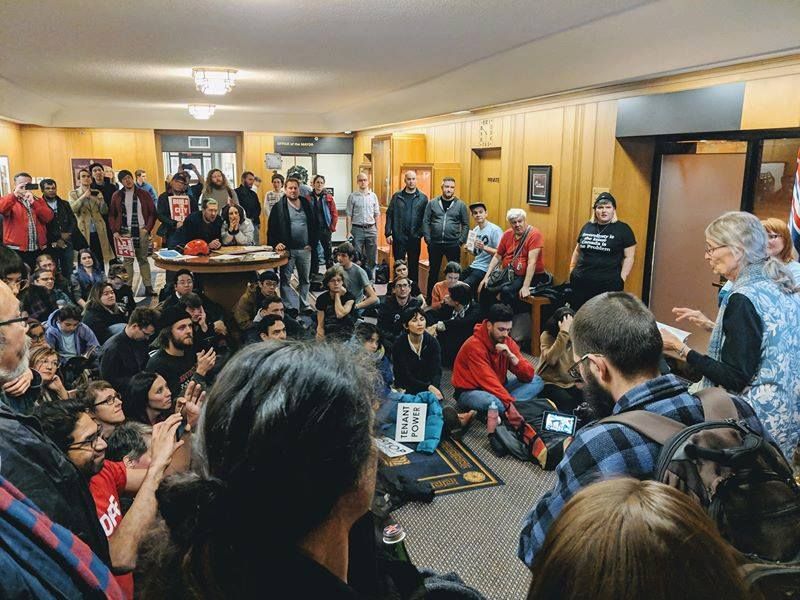Conny Dahmen and Claus Ludwig are membersof Sozialistische Alternative (ISA in Germany).
The police and government are trying to spread fairy tales about alleged violence of the 35,000 strong demonstrators against lignite mining near the village of Luetzerath, in western Germany. But everyone can see on Youtube that the perpetrators of violence wore uniforms.
In spite of police violence, the demonstration on January 14 was a success for the climate movement. The movement is alive and is rallying the masses.
Eye-witness, Sebastian Rave, Bremen: “In Luetzerath, you could see how it works with capitalism and the state: the police beat up demonstrators to pave the way for RWE to get the coal and burn it. The Greens think it’s totally okay and call it the ‘rule of law’ when RWE gets the right to participate in the destruction of the climate. The tens of thousands in Lützerath and many more who saw the events on television learned quite a lot on this day.”
Rain, wind, a tedious journey, several thousand cops and massive amounts of mud kept many people from joining the demonstration. Nevertheless, at least 35,000 came to Luetzerath, the village being destroyed to expand the coal mine. An endless stream of people of all ages moved from the nearby village Keyenberg to the rally. Many only listened to the speeches from afar because of the massive crowds on the street. People came from the region, including families with children; and in the parking lot there were license plates from all over Germany.
Disaster for the Greens
Unlike in the earlier protest in nearby Hambacher Forest, or during the climate strikes, flags of the Green Party were not to be seen. No doubt many Green voters and members were there. That they did not dare to appear openly is a turning point. The obvious connivance between the government of North Rhine-Westfalia (NRW), Green Party members, and RWE, a German energy company, has shocked many. It is not clear whether the Greens will lose votes. But among activists, the rejection is strong. Peter Donatus, an environmental activist from Cologne with Nigerian roots, spoke about the refugee movements in the global south caused by climate change. Addressing the Greens, he said to great applause, “You betrayed us, and now we will fight you!”
Massive violence
There is a battle to win public opinion over what happened during the demo. The police and government claim there was a “riot.” NRW Interior Minister Reul initially talked of “attacks with stones, incendiary devices and pyrotechnics on policemen and policewomen,” that would be “severely punished.” These claims were seconded by the so-called “police union” (GdP), which is more interested in cheering repression than in enforcing wage increases for police employees. This was topped by the GdP branch in the federal state of Saxony-Anhalt, which commented on the pushing around of a policeman stuck in the mud by a demonstrator with “When did humanity cease to exist?” instead of criticizing the way officers are used as a private security unit of RWE.
Eye-witness: Elisa Mellin, Bremen: “I’ve been politically active for a few years, but Luetzerath was so far one of the biggest (and muddiest) demonstrations I’ve been to. More or less by chance, I got relatively close to the police and was able to witness the unwavering energy that the climate activists put into breaking through a police barricade. They were unarmed, unprotected, and only their large numbers could unleash this force. Throughout, the mood was determined and combative in the best sense. On the other hand, the violence with which the state enforces corporate interests is frightening. I have rarely seen such an extensive police contingent, and yet the police forces seemed at times disorganized and overwhelmed, and by no means de-escalating. In the immediate vicinity, people had to be treated by paramedics because they were severely injured by the police, the police beat peaceful demonstrators as if blindly and set their dogs on them.”
The facts are clear: attacks with Molotov cocktails are not documented anywhere. There were no stones to be found in the fields of mud. Some mud clods were thrown at police, while unpleasant, it was about as violent as a snowball fight. A few firecrackers were seen, but there is no evidence that any were thrown at the police.
What is clearly documented is the massive police violence. They charged at the peaceful line of people approaching the village, pepper sprayed and beat the demonstrators with batons. Paramedics reported many head injuries, and ambulances had to be called to transport the wounded.
The dominant mood was one of non-violent militancy. Thousands marched across the fields to obstruct the eviction of Lützerath village. There was no split between “peaceful” and “militant” activists because most agree that civil disobedience against destructive policies and energy companies is necessary. Minister Reul said they would look into whether there had been police abuses. But the entire eviction, the entire operation on January 14, was a single abuse, a police state exercise, with at least four water cannons, dogs and squadrons of horses. The violence was not an overreaction by individual police officers, but was deliberate on the part of the police and the political leadership.
Next level
The more mining goes on under Lützerath, the further the world moves beyond the 1.5°C “target.” Activists fought for years in Lützerath, hundreds stayed until the police occupied the village. Thousands wanted to reclaim the village despite repression and mud, some tried to climb into the open coal mining pit and onto the giant bucket wheel excavators. They were beaten up and suffered serious injuries inflicted by the police because they want to prevent a global catastrophe and against the destruction inflicted by the RWE corporation.
Greta Thunberg raised an important issue in her speech at the rally: as long as the coal is still in the ground, the fight is not over. With the village of Lützerath, a symbol is being destroyed, but what matters is whether they get the coal out of the ground. The potential for further action exists. Another big demo is possible, in the weeks before open pit mining is expanded.
“All villages stay, expropriate RWE!” was a popular slogan raised by Sozialistische Alternative on the demonstration. That should be the strategic approach of the entire movement. The “coal compromise” between RWE and the government accepts the profit interests of RWE and their “right” to dig coal.
Eye-witness: Philipp Chmel, Brussels, co-founder of Workers for Future, Austria: “The demo was incredibly impressive, you could literally feel the motivation and the will of the tens of thousands of people to stop the climate destroying policies. The day was solidarity as a living experience. To bring corporations like RWE and the state with its truncheons, horses and water cannons to their knees, we need an even more powerful movement. Just imagine what would be possible if the tens and hundreds of thousands of workers from fossil sectors and other parts of the economy would strike for higher wages and against the destruction of the climate, or even join the demo as a strike delegation? Now we have to take the energy of the protests and strengthen the links between the climate and workers’ movements.”
Luisa Neubauer of Fridays for Future rightly points out that the Paris Agreement already is a compromise between the needs of the planet and what the companies want. There is nothing to negotiate with the energy companies. Expropriating them and transferring them to public ownership is the way both to save villages, but to stop climate change. Otherwise, new holes may be dug in the earth — not to secure heat and electricity for people but solely to secure the highest possible profits for RWE and others before coal mining ends in 2030 as planned (if it does).
A broad campaign for expropriating RWE and other energy companies and transforming them into democratically controlled publicly owned organizations should start now. In addition to direct mobilization to the coalfields, the Green Party’s offices and events as well as RWE’s offices are the proper focuses for demonstrations and occupations.
Climate and Jobs
In this context, the climate movement should send a clear message to the workforce of RWE and other energy companies. Expropriation is not intended to “punish” RWE employees and will not endanger their jobs. Only the shareholders and board members would lose profits, power, and privileges. In a nationalized company, all workers, technicians, and engineers are needed, with at least the same wages and conditions as today. A publicly-owned, democratically controlled energy sector would become a motor for energy conversion. The whole insanity of coal mining could end tomorrow. The coal mines could be used, for example, as pumped-storage power plants, using renewable energy to pump up water that could be used to store energy and drive hydro turbines when energy demand is higher.
Even if the changeover took a while and workers could not immediately start a new job, no one would have to fear for their income. In the long run, it would be cheaper for society to pay workers to stay at home compared to the costs of continuing to dig and burn coal for RWE profits. But with democratic planning a rapid transition to an energy economy based on renewables is entirely possible.
The climate movement should strengthen its connection to the working class not only where the common interests are obvious, like in public transport, but also in those industries where workers are directly affected by, and worried about change. The capitalists and the parties loyal to them present it as if jobs and climate protection are in conflict. In the end, both the climate and working people suffer from the profit system. A planned, democratic transformation of production, freed from private control and the profit system, would decisively accelerate the climate revolution and at the same time create skilled, secure jobs.



